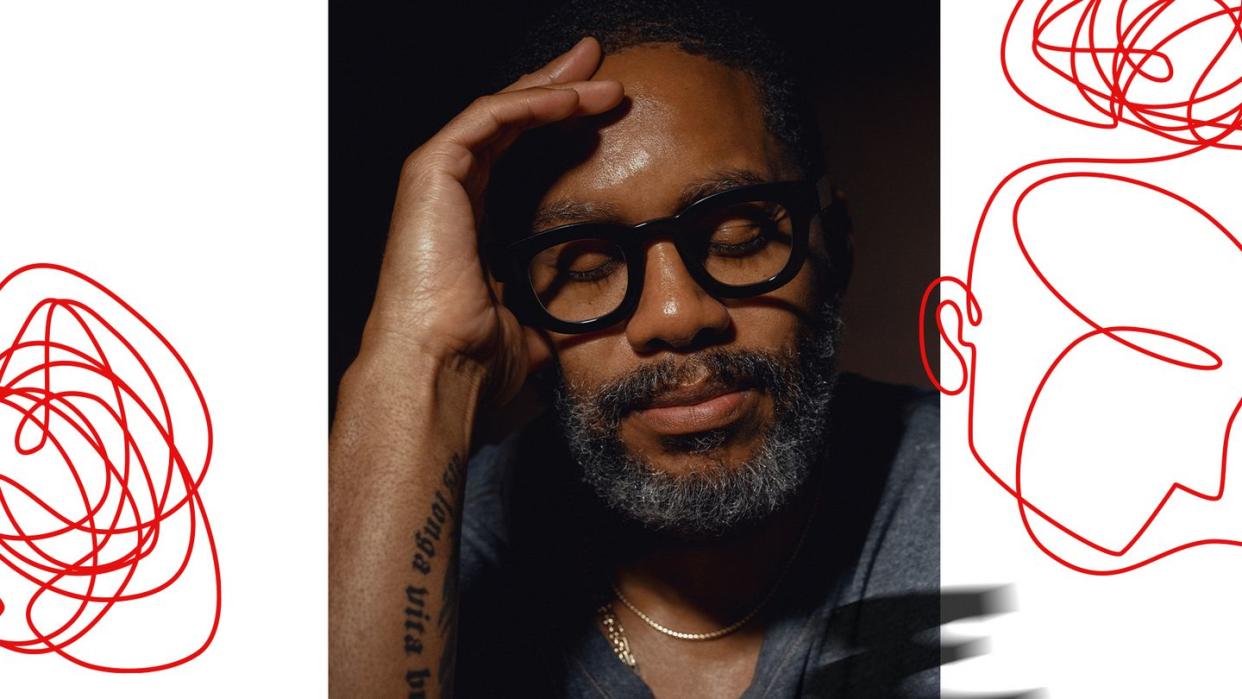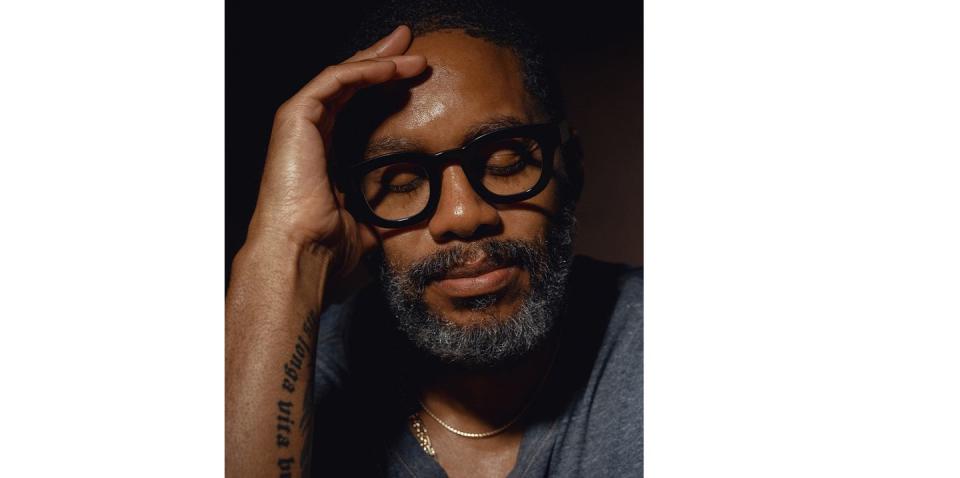How (Not) To Grieve


The homie Kev was kind, smiled easy, and spoke so soft sometimes I had to lean in to hear him. The homie Kev was cock-diesel and fearless on the football field. The homie Kev took the rap for me without a blink when my grandmother caught me packaging bunk weed in my bedroom.
The fall after we graduated, my homie Kevan Hai Miller was found shot to death on an apartment doorstep. What I remember is feeling my response should be governed by my manhood, that I’d be weak if I wept, whether someone saw my eyes leak or not. I’d had practice in not grieving. Going into my senior year, our fireplug point guard had beef with my cousin—not my blood, but our mothers were super close—and shot him. My cousin, amen, lived. And yet we might’ve been more worried about losing our PG for the season than the gravity of such serious violence. We were teenage boys, most of us Black, considering extreme harms, but almost no one was dramatic about it. While grieving forreal forreal would’ve been seen as Hamletian histrionics, fear lay beneath our forged stoicism: Which side of the fray were we on? Were we, too, in peril? Did the circumstances demand our swift vengeance?
To grieve or not to grieve? Often the answer was a mandate: Shake that shit off pronto. We did, however, commemorate the dead homies with ample reminiscing, often while getting faded on weed or liquor. Pouring some of that liquor on a curb. Wearing T-shirts screen-printed with a picture of the deceased. A barbecue or picnic in their honor. A curbside memorial. And for the most brazen: murderous-minded get-back.
None of our rituals amounted to the five stages of grief expressed by Elisabeth Kübler-Ross in On Death and Dying: denial, anger, bargaining, depression, and acceptance.
Denial has always felt like a weakness. Why the hell am I denying what happened, the absolute fact of someone’s death? People get killed. People die from cancer or a seizure or a heart attack or Covid, and while it hurts to lose them, it seems irrational if not insane to protest the reality. The same goes for bargaining, which I’ve also been determined to skip. Why bargain against what can’t be undone? Who am I bargaining with, the deity that allowed it? The same goes for depression, for my refusal to allow that a significant loss could leave me down, down, that my despair is natural and maybe even healthy. My grieving has meant speeding to acceptance, even if I know in my deepest and truest place that acceptance is false. My mourning has been bound by what I’ve been nurtured to believe about the intersections of manhood and blackness—by Black manhood—and those beliefs have made it all but impossible to progress through healthy grieving.
A Black man is ever strong. A Black man don’t cry—he damn sure don’t do no public boohooing. A Black man don’t broadcast his feelings. A Black man don’t cower from anything or anyone. A Black man handles it, whatever it may be.
On the flipside of that armored, unflappable, immutable Black manhood is, God forbid, the jacket of a lame or a sucker or a punk or a pussy or a bitch or soft or weak; is, God forbid, the disgrace of being deemed a man who let his emotions get the best of him, or in other words, a man who let his emotions escape outside of him.
Much of our rubric is cultural. But somebody please show me a part of culture that isn’t also historical.
If epigenetics is real, mightn’t Black grief be shaped by the forbearers of Black Americans having survived the torture of a speculum orum or a dead fellow African coffled to them or a beloved tossed into the Atlantic without a care. Their kin snatched from their outstretched arms and sold to an eternal elsewhere. Their flesh and blood strung from a sturdy branch and beaten or flayed or castrated or set aflame? Their intimates lost to post–Civil War privation or prison cells? Yeah, slavery was ages ago, but if epigenetics is true, how might those traumas have shaped the descendants of the once enslaved?
Not to mention what to make of the collective grief of Black people who witnessed Mike Brown left baking in the street. Eric Garner choked unconscious. George Floyd kneeled into the next life. Tell me, what might those almost inescapable Black traumas do to the genes of Black folks writ large? How might they shape Black men who feel beholden to rigid strictures of manhood?
A case study of three recent personal losses.
November 6, 2022—Fresh off a transatlantic flight, I received a rare call from my sister. “Mitch, Dad passed,” she said. “Dad is gone. Dad is gone.” When I hung up, I watched dreary London lapse past my window and sobbed in silence. That commute wasn’t the only time I wept over my 67-year-old biological father (Wesley Johnson Sr.) dying in his sleep from a seizure, but it was the only time I allowed myself tears without a measure of self-chiding.
July 17, 2023—My beloved Aunt Bonnie had a heart attack and died in her sleep. Just that May, my aunt texted about a dream in which, while she was struggling to write, someone asked her if she knew me. Aunt Bonnie told the person in her dream that she did, and they advised her to have me touch her pen. Aunt Bonnie asked me to bring her pens, “speak a few words over them,” and leave them in her mailbox. The next day, I delivered her a pack of pens and a Moleskine notepad, inscribed, “I pray you take your ambitions all the way!” Aunt Bonnie assured me, “I’m really going to write that memoir this time, nephew.” Months after she died, I returned home from a trip and discovered my cousin had sent me a package with the Moleskine. On its first page, Aunt Bonnie (Bonnie Johnson) had written an account of her dream and of me dropping off the notebook. She ended it, “I will write. I will write. I will write. Nephew, thank you for showing up for the assignment.” Because I was alone, I let myself weep without reserve, the last I lamented her passing without wondering if it had lasted too long.
January 15, 2024—My grandfather passed from complications of pneumonia and Covid. Granddad (I called him Dad) was part of the men I considered my composite pops. He reached 89 years old, and yet his death seemed sudden. This past Christmas I brought Dad chicken and rice and we watched sports. Sure, he moved a little slow from living room to kitchen. Sure, he repeated a couple of questions and responses, but nothing I witnessed suggested he’d be dead in less than a month. And yet, less than a month later, family gathered at his bedside and, while Dad lay brain-dead on a ventilator, said their goodbyes. That same night, I awoke around 2:00 a.m. and, as I’d never done, began cleaning my house. Around 4:00 a.m. I said a teary-eyed prayer for my grandfather (Sam Jackson Jr.), thanked him for being a father to me, wished him heaven-bound, and mourned unbidden for the fact of its privacy.
What’s more doleful, mourning the dead or the living?
My grandfather left his youngest son as an executor of his estate and beneficiary of his retirement account. This is the same uncle who coached me into a track-and-field city champion, who spent umpteen hours helping me work on my hoop skills, who let me stay with him for a few months when my mother was deep in the throes of her addiction. Nonetheless, in the weeks after my granddad passed, the family discovered that my uncle (let’s call him A. J.) withdrew the funds from my granddad’s retirement account and kept most of the money to himself. Kept it regardless to his being but one of my grandfather’s four surviving children. Kept it despite two of his siblings being poor and disabled.
This article appeared in the April/May 2024 issue of Esquire
SUBSCRIBE
I don’t have to give anyone anything, he told us. A breach that has plunged me into what might be my profoundest grief. Because it’s a loss not grounded in the irrevocable. Because, given the natural order, I’ve lost my uncle once and will lose him again. Because how do I forgive the seeming unforgivable?
So here I am groping for what, in On Grief and Grieving, Kübler-Ross and David Kessler describe as the sixth stage—(finding) meaning—and meanwhile experiencing the stages I’ve beat back my whole life. The denial. The bargaining. The depression. Unc, not you. How could you? Don’t do this, Unc, please. It ain’t worth it. What do you need, Unc? Aren’t there other means? Unc, what about Dad’s desires? Unc, I don’t want to lose you, but what choice will this leave me? What if, Unc? What if? What if? Uncle, don’t you love us? In any case, I’m okay? I’ll be okay? I’m strong?
Photograph by: Ryan Pfluger
You Might Also Like

